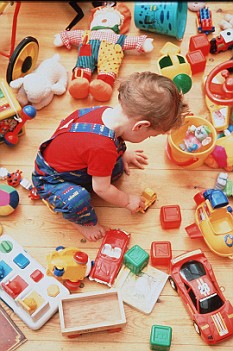Let the baby grow up happily in the game of throwing toys_Tianya Blog_People with insight are here_Tianya Community
Let the baby grow up happily in the game of throwing toys. Babies around 1 year old often play alone, but they don't like to be lonely. They like adults to tease them and accompany them. So when the mother puts the baby on the small bed and is busy with chores, the baby will throw the toys in his hands to the ground, one after another. If the mother picks it up, he will continue to throw it. Sometimes he throws it even faster than the mother can pick it up. The mother may wonder why the baby always likes to throw things.
1. Characteristics of children's physical development
Throwing toys is a common phenomenon in the psychological development process of infants before 1.5 years old, and it is also a manifestation of intellectual development.
At 5 or 6 months, the baby's hand-eye coordination has improved, and they can grab things under visual guidance. At this time, their two hands and the coordination between them are still not very good. When the baby holds a toy in one hand and doesn't want it, instead of using the other free hand to take other toys nearby, he must put down the toy in his hand before taking others. This is the initial sprouting of throwing things.
After 8 months, the baby's behavior becomes more obvious. The more adults prevent him from throwing, the more vigorously he throws. This behavior can be understood as the child being interested in the changes he can make to objects.
When the baby grows to 9 or 10 months, the nervous system develops rapidly, and motor skills have made great progress. At this time, the interaction between the two hands is already very natural, and the flexibility of the fingers is also developing rapidly. The baby likes to grab and throw toys, which is not what adults think as destroying toys, but learning to reinforce the action of throwing, laying the foundation for the future development of hand flexibility.
2. Wanting to attract adult attention
Sometimes adults ignore the child because of their own affairs and let him play alone. The baby will throw toys to attract adults to play with him. When you pick up the toy and pass it to him, he will immediately throw it again. In fact, he is playing a game with you - a game where he throws and you pick up.
Using throwing toys to attract adults to play with him, when an adult approaches, he throws while laughing happily, showing that he is very pleased.
3. Enjoying the sound of toys falling
Some children like different sounds and will try to make toys produce sounds. During the process of throwing things, the baby gains different experiences from the distance, sound, and reaction of different items thrown.
Parents should patiently cooperate with this game. Give the baby some toys with different elasticity that can withstand being thrown, such as balls, plastic toys, wooden blocks, etc., allowing the baby to try and distinguish the properties of objects. As thinking develops, the baby's behavior of throwing toys will soon end.
4. Showing off one's ability by throwing toys.
Not only can I stand up, but I can also throw toys out.
In fact, babies are very smart. Look how well she plays! She invented her own game - throwing. Throwing things is not intentional destruction or deliberately trying to upset mom; rather, the baby is playing. When different things are thrown to the ground, producing different sounds and rolling to unpredictable places, the baby finds it very interesting. This way of playing is a normal need for the baby's physical and mental development.
The perception of infants is vague and one-sided, and their understanding is shallow and superficial. Their cognition of external things depends on sensory impressions. Therefore, the baby will repeatedly perform the same action or behavior without getting tired, deepening the sensation, perception, and cognition of external things. This repetitive action connects the relationship between the baby and you, naturally forming an interaction. The baby develops a parent-child bond with you through this repetition. During this stage, there is no need to criticize or forcibly correct the child's behavior. You can give him things that are less likely to break when thrown. Don't provide too many toys at once, allowing the baby to grow up happily in the game of throwing toys.
